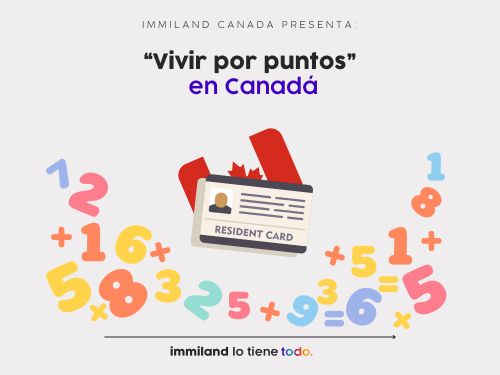"Living for points" in Canada

.jpg)
In Canada, immigrant life is not only measured in effort, adaptation and hard work. It is also measured in points. Points that can open the door to permanent residency. Points that are earned with every step of the day, for example, learning English or French, studying, working, gaining Canadian experience, and more.
There is a lot of talk about points and little understanding of how this system works. What does it mean to "live by points" in Canada? Read to the end and learn the formula for settling permanently thanks to points. Let's get started!
What does it mean to "live by points" in Canada?
From the moment a foreign national arrives in Canada to study or work, every decision can add or subtract from his or her immigration success. Why? Because the Canadian immigration system, especially through Express Entry or the Provincial Programs (PNP), uses points to select those who will receive an Invitation to Apply (ITA) for permanent residence. It does this through regular draws every two weeks.
What do these points reflect?
The points reflect your immigration profile: age, education level, work experience, language proficiency, ties to Canada and other factors. It is the system's way of assessing your potential to successfully settle in the country. The maximum score that can be achieved is 1200, and the average score usually ranges from 470 to 510, although it depends on the type of draw.
Where do these points apply?
Mainly in Express Entry, the most used system to apply for permanent residency. This system uses the CRS (Comprehensive Ranking System) to assign points according to your profile.
The most important factors are:
- Age: between 20 and 29 years old, the highest score is obtained (up to 110 points).
- Education: post-secondary degrees, best if validated with an Educational Credential Assessment (ECA) ( up to 150 points).
- Language: Good scores in IELTS, CELPIP, TEF or TCF can add up to 160 points.
- Work experience: both foreign and Canadian experience is valued (up to 80 points).
- Studies in Canada: they also provide additional points.
- Family or provincial ties: having siblings in Canada or receiving a provincial nomination adds up to important points.
Note: the valid Job Offer used to be able to add up to 200 points, but the Canadian government eliminated this factor on March 25, 2025. See here the official page with more information.
Earn more points with a provincial nomination (NPP)
Provincial Programs (PNP) can add more points to your profile. Each province has its own criteria, but they all share one thing in common: a provincial nomination adds 600 points to the Express Entry profile, and this is decisive.
The average score to receive an invitation in the general draws is usually between 470 and 510 points. By receiving a provincial nomination, you could automatically move to 1000-1100 points, which virtually guarantees an invitation in the next draw.
How to take advantage of the time to accumulate good scores?
When you arrive in Canada, you start living and building your path to permanent residency at the same time. Every decision - to study, to work, to improve your language skills - can add up points towards this status. That is why, from the very beginning, you must act with intention and strategy. You must know your immigration profile before traveling and during your temporary stay, only then will you know where to look for the best points!
There is a points calculator that makes the process easier. You can use our tool: CRS calculator and find out if you are eligible to apply for Express Entry.
And if the system does not respond in time: Mandamus is the solution
After months or years of "living for points", the immigrant has the right to move forward. That effort cannot go unanswered.
When everything has been done correctly and the immigration process is stalled without justification, there is the legal recourse of Mandamus. This mechanism allows you to demand that Immigration Canada make an immediate decision when there are excessive delays. It does not guarantee the result, but it does guarantee that the right to receive a response is respected.
This proceeding is filed in the Federal Court of Canada by a licensed and certified Canadian lawyer.
Legal representation with Immiland Law
If you feel you have reached that point, Immiland Law can offer you legal representation in the process. Because in Canada, every point counts, but more importantly, every step taken with conviction and purpose counts.
If you feel it is necessary, you can fill out our online form: Mandamus, the legal remedy for government inaction. This form will allow us to identify potential candidates for a Mandamus or determine if we can use other types of legal recourse.
I hope it will be helpful for your process. Thanks for reading, see you in the next blog!
With love,
Immiland Law Professional Corporation
Note: This article does not constitute legal advice or legal opinion from an attorney. Rather, it is provided solely to inform readers about certain aspects related to the details of the law in legal matters.








.jpg)















.jpg)